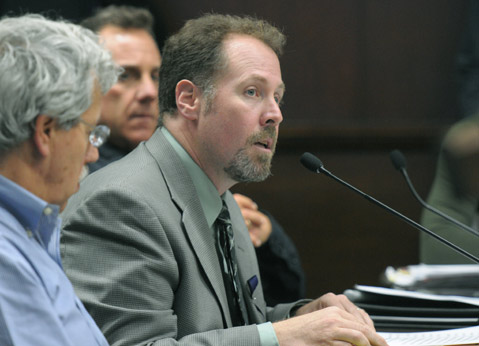Casa Keeps Catching Flack
Milpas Neighbors, Businesses Owners Blast Homeless Shelter

Two weeks after city staff determined the Casa Esperanza homeless shelter on Cacique Street is in compliance with its conditional-use permit after a formal complaint was lodged against the nonprofit, Santa Barbara business owners and neighborhood residents packed the City Council chambers last Thursday to vent about ongoing disruption and crime along the lower Milpas corridor.
Many attendees of the four-hour Planning Commission meeting, which focused on the shelter’s biannual progress report, claimed the majority of these disturbances are caused by the homeless people residing at Casa Esperanza and that the issue has negatively impacted businesses and the quality of life in the neighborhood.
The meeting was opened by SBPD’s Captain David Whitman, who discussed rising crime rates in the area around Casa Esperanza. Since 1999 when the shelter opened, the frequency of Part 1 crimes — more serious or violent offenses — has risen 150 percent while the occurrence of Part 2 crimes — less serious, nuisance-type crimes — has grown 174 percent in the neighborhood and gone up 950 percent at the shelter itself. Captain Whitman emphasized this might be due to the police frequently encouraging citizens and shelter employees to call them when problems arise.
Casa’s executive director, Mike Foley, spoke to the commissioners about less and less funding and resources available to the shelter and about the efforts made by Casa staff to provide Santa Barbara’s homeless with much-needed services while also making an effort to comply with the city in order to maintain a safe and profitable environment for lower-Milpas residents and business owners.
One of the ways in which the Casa aims to achieve amicable relations is through a Good Neighbor Contract, which sets rules shelter residents must comply with in order to remain in their programs. Violating this contract results in varying consequences, which Foley didn’t articulate. “Casa Esperanza is looking forward to finding common solutions for ourselves and the Milpas neighborhood,” he said.
Many complaints made by the Milpas Action Task Force (MATF) and the Milpas Community Association (MCA) alleged that Casa’s members have been not only disruptive but also dangerous. MATF chair Julianna Reichard said many residents feel Casa Esperanza staff is unwilling and unable to take responsibility for the damage done to the neighborhood as a result of the shelter. “The perception of the neighbors is that the Casa resents them,” said Reichard. “They have asked the Casa to modify their ‘Good Neighbor Contract,’ and they have not. MATF and Casa have never come to an agreement on what the ‘Good Neighbor’ policy should state.”
At the end of the meeting, several Milpas Street business owners took the podium to voice similar dissatisfaction. Brent Reichard, owner of the The Habit nearby, expressed outright frustration with what he said is the city’s inability to proactively solve the problem. He said as a city taxpayer in the city it’s “unacceptable” that he and his employees have to consider putting in an $80,000 security system to prevent customers from being harassed.
David Peterson, owner of the Milpas Street McDonald’s, addressed the commission, accompanied by several employees including a young woman who had been spit on by a homeless man upon finding him in the bathroom and asking him “if everything was okay.” A McDonald’s manager was also reportedly hit under his eye by a homeless man and had to be taken to the emergency room, where he received 18 stitches, but he couldn’t afford the plastic surgery doctors recommended.
In his closing statement, Planning Commissioner Michael Jordan noted there existed similar problems two years ago, calling the system “broken.” “The supporters of the Casa need to go after the safety of the community with the same conviction they have to help the homeless,” he said, adding the MAC and MATF need to make such efforts, as well.
Commissioner Deborah Schwartz emphasized the importance of mutual respect and a goal of coexistence rather than finger-pointing. “It’s time for us all to step back and self-reflect,” she said. “It takes good faith; it takes a baseline mutual respect. … I’m going to remain optimistic, but if this process continues to be broken, we’re going to meet at the cliff’s edge.”



